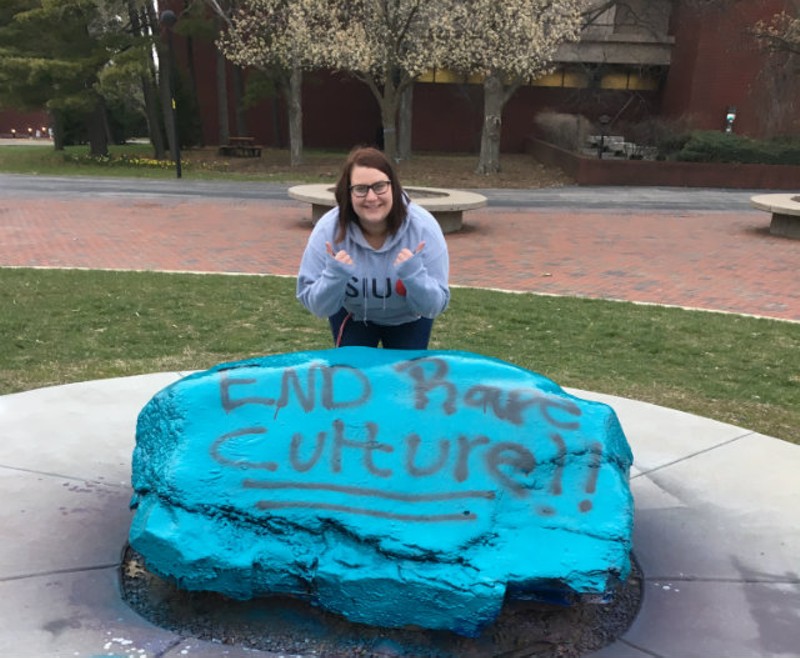On October 17, 2017, Bailey Reed, a senior sociology major at Southern Illinois University Edwardsville, went to the emergency room to report that she had just been raped by a classmate. Campus police arrived to take her statement, and the nurse examiner found a bruise on her cervix, which often indicates sexual assault.
Reed's case avoided all the complicating factors that people tend to use against women who accuse someone of sexual assault. She hadn't been drinking. She said she had told her assailant "no" at least seven times. She told a friend she'd been assaulted almost immediately after she got the classmate out of her apartment — and then made a report to law enforcement within hours. And while text messages showed that Reed's classmate tried to text her the next day, she never texted back. Instead, she reported the incident to both campus police and the college's Title IX Office.
Still, seven months later, Reed continues to fight SIUE. The school has not taken action against her assailant — in fact, the university's chancellor overruled a finding against him by the school's Sexual Harassment Panel, without explanation. It's only because Reed took out an order of protection against him, one that barred him from campus while she was on it, that his education was interrupted. The only criminal charge he has been hit with is a misdemeanor for violating the order of protection.
Her lawyer, Nicole Gorovsky, says the young man was not allowed to be in any classes he had with Reed after she obtained the protective order. Yet he nevertheless showed up in class one day — and sat down right in Reed's chair. Someone called the police, and he was arrested.
Even with that, Gorovsky says, SIUE has sided with her attacker every step of the way.
"We've talked about, 'Let's wait and see if they do the right thing, let's give them the time to do the right thing,'" she says. "We have given them the time, and they have not done it."
Douglas McIlhagga, a spokesman for the university, said it did not agree with Gorovsky's characterization of the case.
“While the University cannot comment on the specifics of Ms. Reed’s case due to Federal student privacy laws, we disagree with Ms. Gorovsky’s statements and her mischaracterization of the process that occurred at SIUE regarding this matter," he said. "SIUE takes all complaints of sexual assault and other forms of sexual harassment very seriously, and seeks to provide a harassment and discrimination free environment to all SIUE students, employees and visitors.”
In the weeks following her report of rape, Reed found herself feeling stranded, as Gorovsky explains in an official complaint to the university. She was told counseling was available — but not for three weeks. She was sent a letter telling her in no uncertain terms to have no contact with the classmate she was accusing, but was given no explanation as to whether he'd received a similar directive.
"She was made to feel that she was being chastised," Gorovsky writes in her summary. "Reed was told that if she wanted to avoid [her alleged rapist], she could 'Skype into class.'"
And four months later, the Title IX Office found that Reed's classmate had not violated any university policies. The seven-page report never even mentions the bruise on her cervix. Instead, it dwells at length on the fact that she may have misstated whether she was in the bathroom or in the car when she sent a text message to a friend following the incident — a fact even the report acknowledges was "not in and of itself very significant."
The report's author seems skeptical about the fact she'd gotten food with a friend before going to the hospital. He also suggests that her description of the rape, which involved her assailant forcing her to give oral sex and then later maneuvering her onto her stomach and then penetrating her while pushing down on her back, was "difficult to envision."
Reed appealed. The case went to the university's Sexual Harassment Panel — and this time, Gorovsky writes in her summary, Reed was able to name an ally, a woman who'd come forward to say she believed she'd come close to being victimized by the same student. After the man started kissing her, the other woman said "no" so loudly that her roommates could hear, she reported, and then screamed "get off me." The woman told Reed she was willing to talk to the university about her experience.
At that, the university's Sexual Harassment Panel overruled the Title IX Office, finding that Reed's alleged rapist had violated SIUE's sexual harassment policy.
But that wasn't the end of the story.
Last month, the university's chancellor, Randall G. Pembrook, overruled the panel in yet another reversal. Instead of telling Reed directly, he sent her lawyer a copy of the letter he'd sent her alleged assailant.
"The letter does not state any reasoning or explanation for the decision," Gorovsky would later write in her summary. "[I]t does not list what the Chancellor reviewed in making his determination, and although it expresses that [the alleged attacker] received all his 'due process rights afforded by University policy,' it does not express any way in which Reed's rights were protected, upheld or considered."
Reed graduated last week, but she is not giving up. Yesterday, Gorovsky wrote to the university's board of trustees, asking them to overrule the chancellor's ruling — allowing the Sexual Harassment Panel finding to stand.
"The choices made by SIUE in the investigation and review of the [rape] case have been abhorrent," the attorney writes. "The findings of the Title IX office read like a textbook lesson in how not to evaluate sexual assault. .... The university failed to uphold her rights, treated her like she did something wrong for reporting what happened to her and projected upon her gender discrimination that is outrageous in modern society. SIU students, and Bailey Reed in particular, deserve better. Fortunately, federal law exists to ensure they get better."
A former prosecutor, Gorovsky says she's shocked by what she's seen in this case.
"It never fails to shock me when institutions protect themselves rather than those they serve," she says. "I don't know why I'm still optimistic going into cases like this, but I am — and then those hopes are devastated."
Through it all, though, Gorovsky says Reed has held firm in wanting her former classmate to see justice. It's one reason why she hasn't wavered in being willing to have her real name be used — and even a photo.
"She knew this was how she wanted to handle it," Gorovsky says. "It was honestly more difficult in that I wanted to explain all the potential consequences to her." But, she says, Reed was certain of her path.
"She's very upset about how the university handled this," Gorovsky says. "She's been very upset from the beginning."
We welcome tips and feedback. Email the author at [email protected]
- Local St. Louis
- News
- Things to Do
- Arts & Culture
- Food & Drink
- Music
- Movies
- St. Louis in Pictures
- About Riverfront Times
- About Us
- Advertise
- Contact Us
- Jobs
- Big Lou Holdings, LLC
- Cincinnati CityBeat
- Louisville Leo Weekly
- Detroit Metro Times
- St. Louis Riverfront Times
- Sauce Magazine



